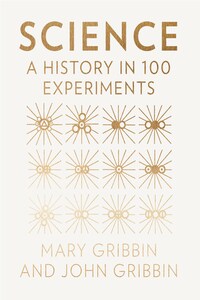William Collins
An imprint of HarperCollinsPublishers
1 London Bridge Street
London SE1 9GF
www.WilliamCollinsBooks.com
This eBook first published in Great Britain by William Collins in 2016
Text © John and Mary Gribbin 2016
Photographs © individual copyright holders
John and Mary Gribbin assert the moral right to be identified as the authors of this work
Edited by Patricia Briggs
A catalogue record for this book is available from the British Library
All rights reserved under International and Pan-American Copyright Conventions. By payment of the required fees, you have been granted the non-exclusive, non-transferable right to access and read the text of this e-book on-screen. No part of this text may be reproduced, transmitted, down-loaded, decompiled, reverse engineered, or stored in or introduced into any information storage and retrieval system, in any form or by any means, whether electronic or mechanical, now known or hereinafter invented, without the express written permission of HarperCollins
Source ISBN: 978-0-00-814560-6
Ebook Edition © October 2016 ISBN: 9780008145613
Version: 2016-09-22
COVER
TITLE PAGE
COPYRIGHT
INTRODUCTION
1 THE UPWARD THRUST OF WATER
2 MEASURING THE DIAMETER OF THE EARTH
3 THE EYE AS A PINHOLE CAMERA
4 DISSECTING THE HUMAN BODY
5 MEASURING THE MAGNETIC FIELD OF THE EARTH
6 MEASURING INERTIA
7 CIRCULATION OF THE BLOOD
8 WEIGHING THE ATMOSPHERE
9 RESISTING THE SQUEEZE
10 REVEALING THE MICROSCOPIC WORLD
11 ALL THE COLOURS OF THE RAINBOW
12 THE SPEED OF LIGHT IS FINITE
13 VITAMIN AT SEA
14 CONDUCTING THE LIGHTNING
15 THE HEAT OF ICE
16 STEAMING AHEAD
17 BREATHING PLANTS AND PURE AIR
18 OPENING UP THE SOLAR SYSTEM
19 ANIMAL HEAT, BUT NO ANIMAL MAGIC
20 TWITCHING FROGS AND ELECTRIC PILES
21 WEIGHING THE EARTH
22 BORING EXPERIMENTS ON HEAT
23 THE FIRST VACCINE
24 FEELING INVISIBLE LIGHT
25 COSMIC RUBBLE
26 FLYING HIGH WITH HYDROGEN
27 LIGHT IS A WAVE
28 DISCOVERING ATOMS
29 ELECTRIFYING SCIENCE
30 QUANTIFYING CHEMISTRY
31 THINKING ABOUT THE POWER OF FIRE
32 A RANDOM WALK
33 THE MAGNETISM OF ELECTRICITY
34 THE DEATH OF VITALISM
35 MAKING ELECTRICITY
36 AN UPLIFTING EXPERIENCE
37 BLOOD HEAT
38 TRUMPETERS ON A TRAIN
39 THE SPEED OF ICE
40 ABSORBING RADIANT HEAT
41 THE LEVIATHAN OF PARSONSTOWN
42 CONTROVERSY AND CONTROLS
43 FROM FIRE LIGHT TO STAR LIGHT
44 PREVENTION IS BETTER THAN CURE
45 PINNING DOWN THE SPEED OF LIGHT
46 DEATH TO BACTERIA
47 THE FLOWERING OF EVOLUTION THEORY
48 THE BENZENE SNAKE DANCE
49 THE MONK AND THE PEAS
50 THE IMPORTANCE OF NOTHING
51 FEELING THE SQUEEZE
52 THE SPEED OF LIGHT IS CONSTANT
53 SPARKING RADIO INTO LIGHT
54 NOBLE GASES AND A NOBLE LORD
55 THE BIRTH OF BIOCHEMISTRY
56 ENTER THE X-RAY
57 ENTER THE ELECTRON
58 RADIOACTIVITY REVEALED
59 KNOCKING ELECTRONS WITH LIGHT
60 A PAVLOVIAN RESPONSE
61 JOURNEY TO THE CENTRE OF THE EARTH
62 INSIDE THE ATOM
63 A RULER FOR THE UNIVERSE
64 THE DISCOVERY OF NUCLEIC ACIDS
65 EVOLUTION AT WORK
66 SOMETHING TO BRAG ABOUT
67 LIGHT FROM THE DARKNESS
68 ELECTRON WAVES AND QUANTUM DUALITY
69 TAKING THE ROUGH WITH THE SMOOTH
70 AN ANTIBIOTIC BREAKTHROUGH
71 SPLITTING THE ATOM
72 MAKING VITAMIN C
73 PROBING PROTEINS
74 ARTIFICIAL RADIOACTIVITY
75 THE CAT IN THE BOX
76 FISSION GETS HEAVY
77 THE FIRST NUCLEAR REACTOR
78 THE FIRST PROGRAMMABLE COMPUTER
79 DISCOVERING THE ROLE OF DNA
80 JUMPING GENES
81 THE ALPHA HELIX
82 A BLEND OF DNA
83 THE DOUBLE HELIX
84 MAKING THE MOLECULES OF LIFE
85 MASERS AND LASERS
86 MAGNETIC STRIPES AND SEA-FLOOR SPREADING
87 DETECTING THE GHOST PARTICLE
88 A VITAL VITAMIN
89 THE BREATHING PLANET
90 THE ECHO OF THE BIG BANG
91 CLOCKING ON TO RELATIVITY
92 MAKING WAVES IN THE UNIVERSE
93 THE PACEMAKER OF ICE AGES
94 THE WORLD IS NON-LOCAL
95 THE ULTIMATE QUANTUM EXPERIMENT
96 THE ACCELERATING UNIVERSE
97 MAPPING THE HUMAN GENOME
98 FIFTEEN EQUALS THREE TIMES FIVE
99 MAKING MATTER MASSIVE
100 THE COMPOSITION OF THE UNIVERSE
EXPERIMENT 101
REFERENCES
INDEX
ACKNOWLEDGEMENTS
ABOUT THE AUTHORS
ABOUT THE PUBLISHER
© NASA/Science Photo Library
Astronaut working on the Hubble Space Telescope (HST) during a routine servicing mission.
© Caltech/MIT/Ligo Labs/Science Photo Library
LIGO gravitational wave detector. Aerial photograph of the Livingston detector site for the Laser Interferometer Gravitational-Wave Observatory (LIGO). LIGO compares measurements between two detector sites 3000 kilometres apart, one near Hanford, Washington, USA, and the other near Livingston, Louisiana, USA. Each site is an L-shaped ultra-high vacuum system, four kilometres long on each side. Laser interferometers are used to look for small changes caused by gravitational waves. LIGO has been operating since 2002, with an advanced upgrade (aLIGO) operating since 2015. On 11 February 2016 it was announced that gravitational waves had been detected by LIGO. The signal was detected on 14 September 2015, and was the result of two black holes colliding.
Science is nothing without experiments. As the Nobel Prize-winning physicist Richard Feynman said: ‘In general, we look for a new law by the following process: First we guess it; then we compute the consequences of the guess to see what would be implied if this law that we guessed is right; then we compare the result of the computation to nature, with experiment or experience [observation of the world], compare it directly with observation, to see if it works. If it disagrees with experiment, it is wrong. In that simple statement is the key to science. It does not make any difference how beautiful your guess is, it does not make any difference how smart you are, who made the guess, or what his name is —








